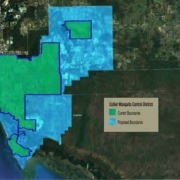Collier Mosquito Control District protects the Public’s Health
Expansion Today Ensures Community’s Public Health and Comfort Tomorrow

John Johnson
The population growth in Collier County is creating a challenge for the Collier Mosquito Control District (District) as it strives to continue to meet its mission to protect public health and comfort.
The problem is this: the District currently encompasses only 401 square miles of the county and does not conduct control efforts outside of its boundaries. New development is being planned or is underway in areas outside of the District, leaving these new residents vulnerable to mosquito-borne disease. In some locations, residents won’t be able to enjoy the outdoors due to exceedingly numerous mosquitoes.
Facing the challenge head-on, District leadership is pursuing a boundary expansion for the 10th time in 70 years, promising to continue its commitment to Collier County residents, both present and future.
In keeping with the legal framework for the process, the District Commissioners unanimously approved a Resolution for expansion. Presented at the Collier County Board of County Commissioners (BOCC) in July 2021, the Resolution passed by a vote of four-to-one. The next step in the process is the drafting and presentation of a local bill to the Collier Legislative Delegation in December. However, the BOCC is revisiting their decision during the Nov. 9 meeting due to concerns of various groups. These concerns primarily focus on publicly owned state and federal lands identified as being within the new boundaries, such as Picayune Strand State Forest and the Rookery Bay National Estuarine Research Reserve.
Why would those uninhabited lands be included? Two reasons: housing is inching closer to these natural areas, and mosquitoes do not respect human-made boundaries. Mosquitoes aren’t going stay in natural, uninhabited areas, and the presence of mosquito-borne diseases will continue to pose a threat to children playing outside or waiting for the bus in the morning; a threat to enjoying an outdoor meal at your favorite restaurant; and a threat to a leisurely stroll with your pet. In simple terms, threat from disease and intolerable numbers of mosquitoes have a negative effect on more than human health. The potential impact our area’s economy is substantial, affecting everything from home sales to tourism.
Mosquitoes carrying diseases ranging from West Nile virus to Keystone virus (which can lead to brain swelling or encephalitis) were recently identified in the Everglades and in Picayune Strand State Forest by Yale University researchers. To protect public health and ensure minimal environmental impact, Chapter 5E-13 of the Florida Administrative Code includes guidelines for mosquito control agencies and public land managers to collaborate on detailed, written Arthropod Control Plans (Plans) for these natural areas.
The District welcomes these collaborations to create Plans which will detail the precise mosquito control activities permitted. The process established by 5E-13 FAC ensures that all parties “have a seat at the table” to equitably negotiate these Plans. However, these Plans are only recognized as binding documents by the Florida Department of Agriculture and Consumer Services (the agency regulating mosquito control agencies) on lands within District boundaries.
As the elected officials who oversee the District’s policies and budgets, as well as effectiveness of its mission, we unanimously approved the expansion policy based on the expertise of the District’s leadership and the sound science supporting the need for expansion. We kindly request that the BOCC join with us in continued support of this expansion Resolution.
It is prudent planning to bring these publicly managed lands into the District and establish mutually agreed-upon, binding Plans, remaining out in front of the threat to public health. As the future unfolds in Collier County, our population will continue to grow, and residential development will continue inching closer to these public lands. Providing all residents with protection against both nuisance and disease-bearing mosquitoes is solidly warranted.

CMCD logo
John Johnson is in his 19th year as an elected official on the Collier Mosquito Control District Board of Commissioners and currently serves as Chair. District Office: 239-436-1000 Email: jjohnson@cmcd.org




Leave a Reply
Want to join the discussion?Feel free to contribute!